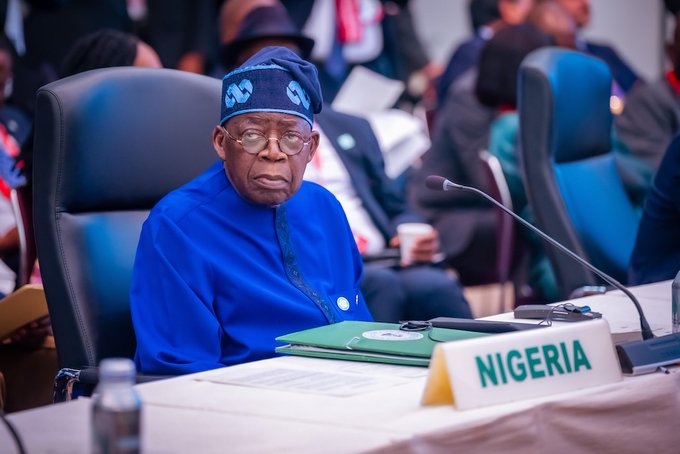By Clement Abayomi
Few Nigerian leaders, like President Bola Ahmed Tinubu, embody the paradox of politics. To some, Tinubu is a master strategist who helped the opposition topple the once-dominant Peoples Democratic Party (PDP) in 2015 and built “bridges” across political divides. To others, he is an archetypal “godfather,” quietly wielding vast influence, with controversies swirling around his wealth. Yet, whichever way he is viewed, Tinubu’s rise to the presidency in 2023 marks the peak of a life that has traversed humble beginnings, activism, and criticism to leave an indelible imprint on Nigeria’s political landscape.
Tinubu was born in Lagos on March 29, 1952, to the merchant family of Abibatu Mogaji, a formidable businesswoman and Ìyál’ọ́jà (market leader) of Lagos. He had his early education in southwestern Nigeria, attending St. John’s Primary School in Lagos and later Children Home School in Ibadan. Growing up in Nigeria’s commercial capital shaped his resilience and sharpened his political instincts.
In the mid-1970s, Tinubu sought opportunities abroad, moving to the United States to work while completing his education. His immigrant student experience—balancing study and employment—instilled in him the fortitude and resourcefulness that would later define his political career.
Tinubu went to Chicago State University, where he graduated in 1979 with a degree in Accounting. With this credential, he secured positions in notable firms including Deloitte, GTE Services Corporation, and Arthur Andersen, working as an accountant. From entry-level to executive roles, he honed his skills in management, finance, and organisational efficiency.
By the early 1980s, Tinubu had returned to Nigeria, joining Mobil Oil Nigeria, where he quickly rose to top management. Yet, corporate security was not enough—Nigeria, trapped in cycles of military rule and political instability, was yearning for reform. Tinubu soon stepped forward to answer that call.
In 1992, he formally entered politics under the Social Democratic Party (SDP), winning the Lagos West senatorial seat. As a senator, he actively debated democratic governance and economic restructuring. However, his tenure was cut short in 1993 when General Sani Abacha dissolved the Senate after annulling the historic June 12 presidential election. The annulment, which denied Moshood Abiola his mandate, sparked one of Nigeria’s darkest political crises.
Tinubu joined the National Democratic Coalition (NADECO), a movement that opposed Abacha’s dictatorship and campaigned for the return of civilian rule. His activism made him a target—he was arrested, briefly detained, and later forced into exile in 1994. From abroad, he amplified Nigeria’s pro-democracy struggle, drawing international attention and building his reputation as a relentless agitator for freedom.
Following Abacha’s sudden death in 1998, Tinubu returned home and contested under the Alliance for Democracy (AD). He won the Lagos State governorship in 1999. His administration quickly distinguished itself through bold reforms, particularly in revenue generation. Tax collection systems were overhauled, boosting Lagos’s internally generated revenue and reducing dependence on federal allocations. He also initiated major transportation projects to ease chronic traffic congestion.
Tinubu in early 2000
His tenure was not without controversy. His creation of new Local Council Development Areas (LCDAs) triggered a protracted battle with the federal government, which withheld statutory funds from Lagos. Nonetheless, Tinubu served two terms, leaving office in 2007 with Lagos financially stronger and more autonomous than ever before.
Rather than retreating from politics, Tinubu expanded his influence. He became a kingmaker in Lagos, shaping the succession of governors, while extending his reach nationally. He played a central role in merging opposition parties—the Action Congress of Nigeria (ACN), Congress for Progressive Change (CPC), All Nigeria Peoples Party (ANPP), and a faction of the All Progressives Grand Alliance (APGA)—to form the All Progressives Congress (APC). This coalition broke the PDP’s 16-year grip on power in 2015, paving the way for Muhammadu Buhari’s historic victory.
Though critics accused him of “godfatherism,” his supporters hailed him as a strategist who kept Nigeria’s fragmented opposition united. In 2022, Tinubu declared his presidential ambition with the slogan “Emi Lokan” (“It’s my turn”).
He went on to win the February 25, 2023 election with 8.79 million votes, defeating Atiku Abubakar (6.98 million) and Peter Obi (6.1 million), according to Nairametrics.
On May 29, 2023, Bola Ahmed Tinubu was sworn in as Nigeria’s 16th president. It was both a national milestone and a personal triumph. From exile to the presidency, Tinubu’s story reflects the contradictions of Nigerian politics: resilience and conflict, reform and patronage, idealism and pragmatism.
Now, faced with pressing challenges—rampant insecurity, inflation, and widespread public mistrust—President Tinubu must rise beyond the politics of strategy and patronage to true statesmanship. His ultimate test lies in proving that under his leadership, democracy can deliver security, prosperity, and hope to millions of Nigerians long waiting for genuine change.



